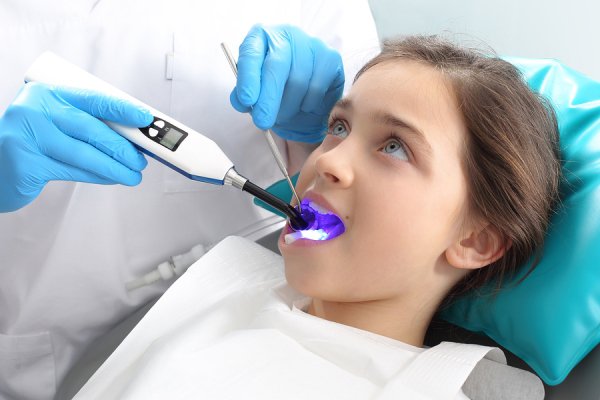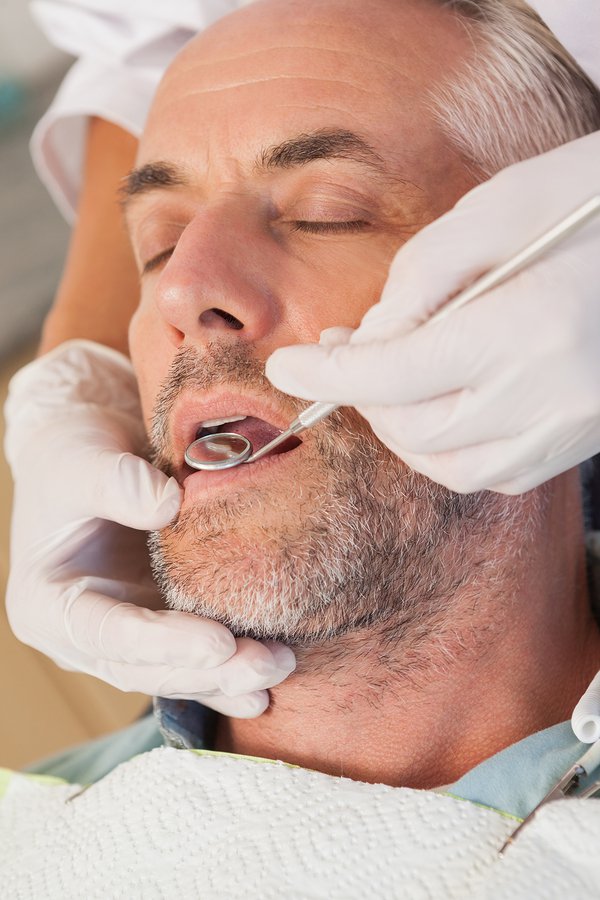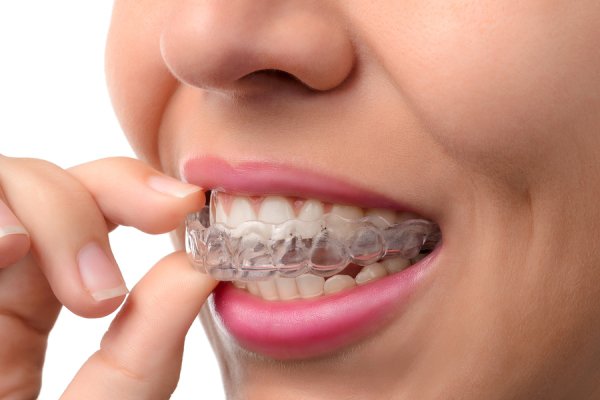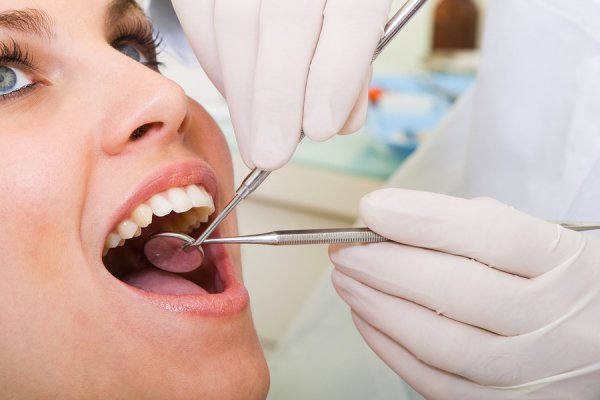-
Answers to Your Questions About Laser Dentistry

Has your dentist in St. Louis started using laser dentistry ? Laser dentistry is an innovative new technique in family dental care that allows dentists to perform both routine and complex procedures without a dental drill. With laser dentistry, patients feel virtually no pain, vibration, or noise. Additionally, dentists are able to complete multiple procedures in a single appointment. Continue reading for some answers to frequently asked questions about laser dentistry.
What Is Laser Dentistry?
Laser dentistry works when a dentist relies on a laser instead of a scalpel to perform dental procedures. With laser dentistry, dentists can do everything from filling cavities to performing root canals. Dental lasers can even be used to reduce the discomfort of cold sores or canker sores. With surgery, dental lasers act as a cutting mechanism. But dental lasers can also be used to “cure,” or set dental fillings and other bonds. Laser dentistry is a general term, so you should ask your dentist which kind of laser he or she uses.Why Laser Dentistry?
Lasers have been used in dentistry for over two decades, and dentists regularly praise their reliability. However, the best part about laser dentistry is that it cuts down on a patient’s pain—and time spent in a dentist’s chair. With laser dentistry, dentists perform hard and soft tissue procedures with no anesthesia and virtually no bleeding. Because lasers are so much faster invasive than scalpels, dentists can execute formerly complex, multi-appointment procedures in just one appointment.How Is Aftercare Different with Laser Dentistry?
Because laser dentistry is so much less invasive than traditional dental surgery, patients do not experience the same kind of painful healing process. Patients who no longer have to go under general anesthesia are able to go about with their days instead of going home to rest for at least 24 hours. Because lasers are more precise, dentists no longer have to damage healthy tissues as a side effect of removing cavities, which translates into shorter healing time for patients.To find out more about laser dentistry with Dr. Spalitto, call (314) 821-2712 today.
-
Causes of Tooth Discoloration
Teeth whitening is one of the most popular procedures in cosmetic dentistry in St. Louis . Dr. Spalitto routinely performs teeth whitening procedures in his office, helping patients achieve brighter smiles in just one visit!The teeth can lose their white color for a variety of reasons. Teeth can become externally stained by food, dark beverages, or tobacco products. A dentist also treats teeth that have become internally discolored due to cavities or after a dental procedure. Some medications may also cause the teeth to appear yellow or darkened. Finally, teeth can lose their white sheen for genetic reasons or as a natural side effect of aging. Fortunately, cosmetic dentistry now provides many safe and effective teeth whitening solutions.
Learn more about teeth whitening and other cosmetic dentistry procedures by calling Dr. Spalitto at West County Dental at (314) 821-2712. We do in-office teeth whitening that only takes twenty minutes and doesn’t cause any sensitivity.
-
What to Expect After a Root Canal

After root canals in St. Louis with Dr. Spalitto, you can expect some tenderness, but an overall quick recovery. Some patients may be wondering, what is a root canal? Root canals are procedures performed by a dentist to repair and save teeth that have become badly decayed or infected. While some people feel understandably anxious about root canal pain, root canals are very common procedures in modern dentistry and are perfectly safe. Continue reading to find out more about what you can expect after you visit Dr. Spalitto for a root canal.
Initial Sensitivity
After your dentist completes your root canal, you should expect some sensitivity and soreness. Remember, root canals are minor surgeries, and the mouth needs time to heal. As your body undergoes the natural healing process, be sure to follow your dentist’s instructions to ward off lingering root canal pain. You can take over-the-counter pain medications to reduce pain and swelling and you may also want to rely on soft foods to avoid biting down.Intermediary Recovery
After your root canal, your tooth will either be sealed with a permanent or temporary filling. If a temporary filling is placed, you should not chew on the tooth until it is restored by your dentist. In the meantime, you may expect for a thin layer of the filling to wear off and for the tooth to feel slightly sensitive and fragile. However, the initial swelling should die down after a couple days. Contact your dentist if it does not.Permanent Restoration
To ensure your tooth’s long-term health, you will need to return to your dentist to have the tooth restored in a second appointment. Because a tooth that needs a root canal almost always has a filling or significant decay, a crown or other restoration is placed to make the tooth functional again.Find out more about root canals or schedule an appointment with Dr. Spalitto by calling the team at West County Dental at (314) 821-2712. Our office practices family dentistry and cosmetic dentistry and is pleased to offer the latest dental procedures and techniques. Call us today or visit our website to learn more about our services.
-
Types of Dental Sedation

If you suffer from dental anxiety , you may want to consider visiting a sedation dentist who practices family dentistry near St. Louis. Many dental patients feel nervous or afraid before going to the dentist, but a sedation dentist can ensure that the entire experience is calming and pleasant!
Sedation dentistry uses medication to relax patients during their visit to the dentist’s office. Sedation is generally safe for patients of all ages and for a variety of procedures in family dentistry. When a dentist administers medication, patients are immediately relieved of anxiety. With nitrous oxide, patients experience a mild sedative effect but are still able to communicate with a dentist throughout the visit. Patients can still communicate with their dentist, but may not remember much of the visit—and will need a friend to drive them home. If you prefer to avoid needles, your dentist can administer sedation through oral medication instead.
Find our more about sedation dentistry or family dentistry by speaking directly with a sedation dentist. Call Dr. Spalitto at West County Dental at (314) 821-2712 to get started!
-
Why Straight Teeth Are Better for Your Health

Are you considering Invisalign near St. Louis? Invisalign is increasingly popular in family dentistry , as more and more patients of all ages visit Dr. Spalitto to straighten their teeth with clear braces. Everyone knows that straight teeth can dramatically improve your cosmetic appearance, and visiting a dentist for braces can make you look and feel younger. However, correcting misaligned, gapped, or overlapping teeth with Invisalign can also improve your oral and overall health. Continue reading to find out how straight teeth lower your risk for cavities, gingivitis, and disease.
Easier Cleaning
Your dentist may recommend straightening your teeth with a retainer, braces, or Invisalign so you can protect yourself against tooth decay. Invisalign is especially recommended in family dentistry because they do not involve wire brackets. With traditional braces, your oral hygiene routine can be complicated by trying to remove sticky foods and floss between wires. With Invisalign, you can simply remove your aligners and continue brushing and flossing your teeth the way you normally do.Healthier Teeth
When the teeth are properly aligned, the gums fit more securely around the teeth. If your teeth are too crowded or too widely spread, your gums can become red and inflamed. Unfortunately, these are also symptoms of gum disease. If gum disease is allowed to progress, it can lead to the next stage known as periodontitis, which is an even more serious concern. If severe periodontitis develops, the disease can potentially impact other aspects of your overall health. Fortunately, straightening your teeth moves them into the proper position and helps you ward off gum disease.Improved Self-Esteem
While you may not initially think of your self-confidence as being related to your overall health, people with high self-esteem are both happier and healthier. Confident people are more inclined to leave the home to socialize, and close relationships with friends and family are associated with better mental health. Additionally, confident men and women are better positioned to achieve success in their careers.If you are interested in Invisalign, find out if clear braces are right for you by calling Dr. Spalitto at West County Dental. Speak to a dental team member directly by dialing (314) 821-2712.
-
What Is Baby Bottle Tooth Decay?
Dr. Spalitto, your dentist in St. Louis , is committed to helping your family achieve good oral health at all stages of life. That is why baby bottle tooth decay is one issue our family dentistry practice educates patients about. This video explains this risk to your child’s developing teeth.
Baby bottle tooth decay occurs when baby teeth are exposed to sugary liquids for long periods. At your next family dentistry appointment, talk to your dentist about ways to avoid this kind of decay, such as never putting your child to bed with a bottle.
Regular family dentistry appointments at West Country Dental will help you manage your baby’s oral health. To schedule an appointment, please call (314) 821-2712 today.
-
An Inside Look at the Dental Implant Procedure

If you have suffered tooth loss—whether you have lost a single tooth or need a full mouth restoration—Dr. Spalitto and his team at West County Dental are here to help you explore your treatment options. Dental implants are one way people are reclaiming their beautiful smiles after losing teeth. If you are considering dental implants in St. Louis , here is a look at two possible approaches to the procedure.
3-Stage Dental Implants
With three-stage dental implants, your dentist first places a post into your jaw that will act as support for your implant and mimic a natural tooth root. After the post is placed, it is allowed to fuse with your bone in a process called osseointegration. This ensures that the implant is stable and acts like a natural tooth. After osseointegration is complete, your dentist will expose the post through a small incision in your gums and attach an abutment, which will serve as a bridge between the crown and the post of your implant. In some cases, a crown is attached to the abutment at this time. In other cases, your gum tissue is allowed to heal around the abutment before a crown is attached. The entire procedure takes three to six months.1-Stage Dental Implants
For some patients, it is possible to get dental implants in one day. Using keyhole surgery, your dentist can place the entire implant and crown in one procedure. Because the implant is placed using keyhole surgery, there is less disruption of the soft tissue, which can decrease the healing time and any post-procedure discomfort. One-stage implants are not right for every patient. Dr. Spalitto will determine which approach is right for you based on a number of factors, including the health of your jaw, your preferences, and how many teeth you are having replaced.To find out if dental implants are right for you, call West County Dental at (314) 821-2712 to schedule a consultation. In addition to dental implants, our family dentistry practice offers a range of services, from tooth extraction to treatment for gum disease.
-
What Is an Abscessed Tooth?

An abscessed tooth is a dental infection that could have long-term implications for your oral health if left untreated. Fortunately, your dentist in St. Louis can provide treatment to cure the infection and prevent long-term complications.
An abscessed tooth occurs when the pulp becomes infected and dies. This can cause inflammation that leads to aching, painful chewing, and swollen gums. A bump may also appear on the gums near the infected tooth. When left untreated, an abscess can spread to the bone and surrounding tissue, and could cause tooth loss and the need for dentures or dental implants. Your dentist can treat an abscess by performing a root canal to clean out the pulp and bacteria and seal the area to prevent further infection. A crown can then be placed to build the tooth back up and address any cosmetic concerns that were caused by the infection.
If you experience any of the symptoms of an abscessed tooth, contact Dr. Spalitto’s family dentistry practice for an appointment and diagnosis. You can reach our office at (314) 821-2712.
-
When Are Root Canals Necessary?
 Root canals are common procedures used to save a tooth that is decayed or damaged. Although the procedure has a reputation for causing anxiety in dental patients, in reality, most find it to be similar to having a filling. If you have questions about root canals in St. Louis, talk to your dentist about what to expect during your procedure. Here are some of the reasons why your family dentist may recommend a root canal.
Root canals are common procedures used to save a tooth that is decayed or damaged. Although the procedure has a reputation for causing anxiety in dental patients, in reality, most find it to be similar to having a filling. If you have questions about root canals in St. Louis, talk to your dentist about what to expect during your procedure. Here are some of the reasons why your family dentist may recommend a root canal.Deep Cavities
In some cases, cavities can be treated with a dental filling. However, when the decay is deep in the tooth, a root canal may be necessary. Your dentist will recommend a root canal if the decay has infected the pulp of your tooth. Performing a root canal allows your dentist to remove the decay completely, so that it doesn’t affect your jaw or neighboring teeth. Note that the level of pain associated with your decayed tooth is not an indication of how deep the decay is. In some cases, very deep decay may not cause pain.Abscesses
If the pulp of your tooth becomes decayed and dies, a pus pocket may form at the end of the root. The abscess will continue to collect pus and grow, and it may form a pimple-like bump on the gums. Left untreated, an abscess will grow and cause an infection in the jaw bone and surrounding tissue that could lead to tooth loss. Your dentist can clean out the bacteria that are causing the abscess by performing a root canal.Trauma
If your tooth is hit with force, the nerve at the end of the root could be severed. As a result, the root will die. Likewise, if a fracture occurs, it could extend to the pulp. After a trauma, a root canal procedure with a crown can be used to restore the tooth. In some cases, the effects of a trauma aren’t seen until many years after an accident, when a root canal becomes necessary.If you are experiencing symptoms of severe tooth decay, a dentist can help you determine if you need a root canal. At West County Dental, Dr. Spalitto and his team are ready to provide the family dentistry services you need. To schedule an appointment, please call (314) 821-2712.
-
Tips for Caring for Your Teeth In Your Senior Years

As you age, your risk increases for developing dental problems, such as gum disease, tooth decay, and tooth loss. You can minimize this risk by caring for your teeth at home by brushing and flossing regularly, and visiting a dentist near you in St. Louis for professional cleanings and dental care checkups. To avoid costly cosmetic dentistry procedures in the future, follow these tips for caring for your teeth in your senior years.
Keep an Eye Out for Oral Health Issues
Seniors are more vulnerable to certain oral health issues, such as dental cavities, tooth decay, periodontal disease, and dry mouth. These problems can develop or become exacerbated by health problems and lifestyle choices. Certain medications can cause dry mouth, increasing your risk of tooth decay, periodontal disease, and tooth loss. A poor diet, poor dental care, and smoking can also contribute to these risks. If you notice symptoms of any oral health issues, visit Dr. Spalitto and his team as soon as possible. Keeping up with your dental health also improves your quality of life! Being able to keep healthy teeth for longer gives you the ability to keep more teeth and eat what you enjoy!Visit the Dentist Regularly
Regular visits to the dentist provide you with an opportunity for a professional oral health screening. Your dentist will look for signs of periodontal disease, cavities, and oral cancer. If these issues are caught early enough, you may be able to keep your natural teeth. Without proper dental care from a dentist, however, and you may need to undergo a root canal procedure or tooth extraction.Seek Cosmetic Dentistry Procedures When Necessary
If your tooth becomes severely damaged due to injury, cavities, tooth decay, or periodontal disease, your dentist may have to perform a tooth extraction. You shouldn’t wait too long before turning to cosmetic dentistry procedures to replace a missing tooth. The longer you have a gap in your teeth, the more your remaining teeth will begin to shift out of alignment to fill the gap. A cosmetic dentist can replace your missing tooth with a dental implant or dentures. A dentist who practices sedation dentistry can even administer medication that will help you relax during the dental surgery.Dr. Spalitto is the dentist on staff for a local nursing and rehabilitation care center, and is very in tune with caring for seniors and their dental health!
RECENT POSTS
categories
- Uncategorized
- crowns
- dental veneers
- dentists
- full service dental practice
- porcelain veneers
- same day crowns
- Dental Cosmetic Surgery
- Dental Implants
- Dentistry
- Dentist Review
- Laser Dentistry
- Root Canal
- Sedation Dentistry
- Dentures
- Cleanings
- Teeth Whitening
- Abscessed Teeth
- Cosmetic Dentistry
- Infographic
- Cavities
- Sealants
- Gum Recession
- Periodontal Disease
- Dental Health
- Family Dentistry
- Dental Emergency
- Invisalign
- Filling
- Same Day Dental Procedures
- Gum disease
- Sleep Apnea
Archives
2022
2021
- December (2)
- November (1)
- October (3)
- September (2)
- August (2)
- July (2)
- June (2)
- May (2)
- April (2)
- March (2)
- January (2)
2020
2016
2015
- December (4)
- November (3)
- October (3)
- September (4)
- August (4)
- July (4)
- June (4)
- May (3)
- April (3)
- March (4)
- February (5)
- January (6)

